Jessybrown
On this page, you find all documents, package deals, and flashcards offered by seller jessybrown.
- 2350
- 0
- 36
Community
- Followers
- Following
2386 items
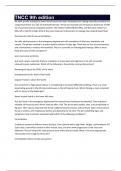
TNCC 9th edition
An adult pt who sustained a severe head trauma has been intubated and is being manually ventilated via a bag-mask device at a rate of 18 breaths/minute. The pt has received one intravenous fluid bolus of 500 mL of warmed isotonic crystalloid solution. the PaCO2 is 30mmHg (4.0 kPa), and the pulse oximetry is 92%. BP is 142/70 mmHg. What is the most important intervention to manage the cerebral blood flow? Decrease the rate of manual ventilation An older adult presents to the emergency depart...
- Package deal
- Exam (elaborations)
- • 10 pages •
-
TNCC EXAMS • By jessybrown
An adult pt who sustained a severe head trauma has been intubated and is being manually ventilated via a bag-mask device at a rate of 18 breaths/minute. The pt has received one intravenous fluid bolus of 500 mL of warmed isotonic crystalloid solution. the PaCO2 is 30mmHg (4.0 kPa), and the pulse oximetry is 92%. BP is 142/70 mmHg. What is the most important intervention to manage the cerebral blood flow? Decrease the rate of manual ventilation An older adult presents to the emergency depart...
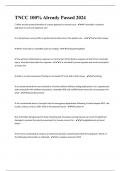
TNCC 100% Already Passed 2024
C What are the primary benefits of a team approach to trauma care - it provides a systemic approach to care and organizes care A In the primary survey AVPU is performed to determine if the patient can: - Protect their aiway B WHich may lead to unreliable pulse ox reading - carboxyhemoglobin A The systemic inflammatory response is a normal part of the body's response to shock from traumatic injury. what best describes this response - it is activated by tissue hypoxia and sends neutrophils ...
- Package deal
- Exam (elaborations)
- • 6 pages •
-
TNCC EXAMS • By jessybrown
C What are the primary benefits of a team approach to trauma care - it provides a systemic approach to care and organizes care A In the primary survey AVPU is performed to determine if the patient can: - Protect their aiway B WHich may lead to unreliable pulse ox reading - carboxyhemoglobin A The systemic inflammatory response is a normal part of the body's response to shock from traumatic injury. what best describes this response - it is activated by tissue hypoxia and sends neutrophils ...
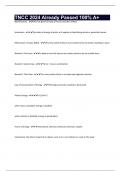
TNCC 2024 Already Passed 100% A+
Biomechanics - is the general study of forces and their effects kinematics - the study of energy transfer as it applies to identifying actual or potential injuries Mechanism of Injury (MOI) - is how external forces are transferred to the body, resulting in injury Newton's First Law - a body at rest will stay at rest unless acted on by an outside force Newton's Second Law - Force = mass x acceleration Newton's Third Law - For every action there is an equal and opposite reaction Law of Co...
- Package deal
- Exam (elaborations)
- • 4 pages •
-
TNCC EXAMS • By jessybrown
Biomechanics - is the general study of forces and their effects kinematics - the study of energy transfer as it applies to identifying actual or potential injuries Mechanism of Injury (MOI) - is how external forces are transferred to the body, resulting in injury Newton's First Law - a body at rest will stay at rest unless acted on by an outside force Newton's Second Law - Force = mass x acceleration Newton's Third Law - For every action there is an equal and opposite reaction Law of Co...
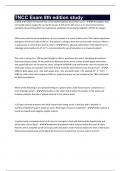
TNCC Exam 8th edition study
1.What is the effect of hypothermia on the oxyhemoglobin dissociation curve - Hemoglobin does not readily release oxygen for use by the tissues A shift to the left occurs in an environment of low metabolic demand (hypothermia, hypocapnia, alkalosis), increasing hemoglobin's affinity for oxygen. EMS arrives with the intoxicated driver of a car involved in a motor vehicle crash. EMS reports significant damage to the driver's side of the car. The patient is asking to have the cervical collar ...
- Package deal
- Exam (elaborations)
- • 9 pages •
-
TNCC EXAMS • By jessybrown
1.What is the effect of hypothermia on the oxyhemoglobin dissociation curve - Hemoglobin does not readily release oxygen for use by the tissues A shift to the left occurs in an environment of low metabolic demand (hypothermia, hypocapnia, alkalosis), increasing hemoglobin's affinity for oxygen. EMS arrives with the intoxicated driver of a car involved in a motor vehicle crash. EMS reports significant damage to the driver's side of the car. The patient is asking to have the cervical collar ...
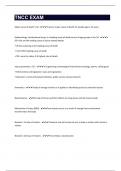
TNCC EXAM
Major cause of death 1-44 - Trauma: major cause of death for people ages 1-44 years Epidemiology: Unintentional injury is a leading cause of death across all age groups in the US - • 65+ falls are the leading cause of injury-related deaths • 25-64: poisoning is the leading cause of death • 5-24: MVC leading cause of death • TBI: more for males, 0-4 highest rate of death Injury prevention: 3 E's - • Engineering: technological interventions (airbags, alarms, safety gear) • Enfo...
- Package deal
- Exam (elaborations)
- • 26 pages •
-
TNCC EXAMS • By jessybrown
Major cause of death 1-44 - Trauma: major cause of death for people ages 1-44 years Epidemiology: Unintentional injury is a leading cause of death across all age groups in the US - • 65+ falls are the leading cause of injury-related deaths • 25-64: poisoning is the leading cause of death • 5-24: MVC leading cause of death • TBI: more for males, 0-4 highest rate of death Injury prevention: 3 E's - • Engineering: technological interventions (airbags, alarms, safety gear) • Enfo...
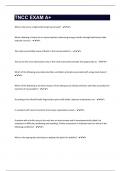
TNCC EXAM A+
What is the key to a high performing trauma team? - x When obtaining a history for an injured patient, determing energy transfer through biochemical data help the nurse to: - x The major preventable cause of death in the trauma patient is: - x The across-the-room observation step in the inital assessment provides the opportunity to: - x Which of the following accurately describes ventilation principles associated with a bag-mask device? - x Which of the following is the best measure of th...
- Package deal
- Exam (elaborations)
- • 5 pages •
-
TNCC EXAMS • By jessybrown
What is the key to a high performing trauma team? - x When obtaining a history for an injured patient, determing energy transfer through biochemical data help the nurse to: - x The major preventable cause of death in the trauma patient is: - x The across-the-room observation step in the inital assessment provides the opportunity to: - x Which of the following accurately describes ventilation principles associated with a bag-mask device? - x Which of the following is the best measure of th...
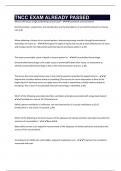
TNCC EXAM ALREADY PASSED
What is the key to a high performing trauma team? - Consistent communication (Communication, cooperation, and coordination are the foundations of successful teamwork in trauma care p.6) When obtaining a history for an injured patient, determining energy transfer through biomechanical data helps the nurse to: - Anticipate the types of injury that may be present (Mechanism of injury and energy transfer can help predict potential injuries and injury patterns p.29) The major preventable cause ...
- Package deal
- Exam (elaborations)
- • 4 pages •
-
TNCC EXAMS • By jessybrown
What is the key to a high performing trauma team? - Consistent communication (Communication, cooperation, and coordination are the foundations of successful teamwork in trauma care p.6) When obtaining a history for an injured patient, determining energy transfer through biomechanical data helps the nurse to: - Anticipate the types of injury that may be present (Mechanism of injury and energy transfer can help predict potential injuries and injury patterns p.29) The major preventable cause ...
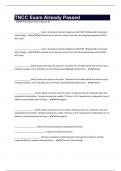
TNCC Exam Already Passed
- Prehospital shock index pg. 85 ____________ ___________ Injury: shearing or tearing. Diagnosed with MRI. Widespread microscopic hemorrhage. - Diffuse Axonal Injury (Cannot recover from this; shearing/tearing portion DOES NOT heal) ____________ ___________ Injury: shearing or tearing. Diagnosed with MRI. Widespread microscopic hemorrhage. - Diffuse Axonal Injury (Cannot recover from this; shearing/tearing portion DOES NOT heal) ______________ Shock: Spinal cord injury at any level. Trans...
- Package deal
- Exam (elaborations)
- • 271 pages •
-
TNCC EXAMS • By jessybrown
- Prehospital shock index pg. 85 ____________ ___________ Injury: shearing or tearing. Diagnosed with MRI. Widespread microscopic hemorrhage. - Diffuse Axonal Injury (Cannot recover from this; shearing/tearing portion DOES NOT heal) ____________ ___________ Injury: shearing or tearing. Diagnosed with MRI. Widespread microscopic hemorrhage. - Diffuse Axonal Injury (Cannot recover from this; shearing/tearing portion DOES NOT heal) ______________ Shock: Spinal cord injury at any level. Trans...
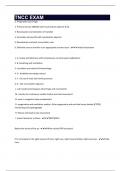
TNCC EXAM
1. Preparation and Triage 2. Primary Survery (ABCDE) with resuscitation adjuncts (F,G) 3. Reevaluation (consideration of transfer) 4. Secondary Survey (HI) with reevaluation adjuncts 5. Reevaluation and post resuscitation care 6. Definitive care of transfer to an appropriate trauma nurse - Initial Assessment 1. A- airway and Alertness with simultaneous cervical spinal stabilization 2. B- breathing and Ventilation 3. circulation and control of hemorrhage 4. D - disability (neurologic sta...
- Package deal
- Exam (elaborations)
- • 14 pages •
-
TNCC EXAMS • By jessybrown
1. Preparation and Triage 2. Primary Survery (ABCDE) with resuscitation adjuncts (F,G) 3. Reevaluation (consideration of transfer) 4. Secondary Survey (HI) with reevaluation adjuncts 5. Reevaluation and post resuscitation care 6. Definitive care of transfer to an appropriate trauma nurse - Initial Assessment 1. A- airway and Alertness with simultaneous cervical spinal stabilization 2. B- breathing and Ventilation 3. circulation and control of hemorrhage 4. D - disability (neurologic sta...
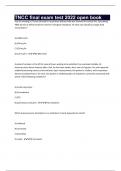
TNCC final exam test 2022 open book
You are treating a 27-year old male in respiratory distress who was involved in a house fire. Calculating TBSA burned is deferred d/t the need for emergent intubation. At what rate should you begin fluid resuscitation? A) 1000 mL/hr B) 500 mL/hr C) 250 mL/hr D) 125 mL/hr - B) 500 mL/hr A patient has been in the ED for several hours waiting to be admitted. He sustained multiple rib fractures and a femur fracture after a fall. He has been awake, alert, and c/o leg pain. His wife reported ...
- Package deal
- Exam (elaborations)
- • 17 pages •
-
TNCC EXAMS • By jessybrown
You are treating a 27-year old male in respiratory distress who was involved in a house fire. Calculating TBSA burned is deferred d/t the need for emergent intubation. At what rate should you begin fluid resuscitation? A) 1000 mL/hr B) 500 mL/hr C) 250 mL/hr D) 125 mL/hr - B) 500 mL/hr A patient has been in the ED for several hours waiting to be admitted. He sustained multiple rib fractures and a femur fracture after a fall. He has been awake, alert, and c/o leg pain. His wife reported ...
